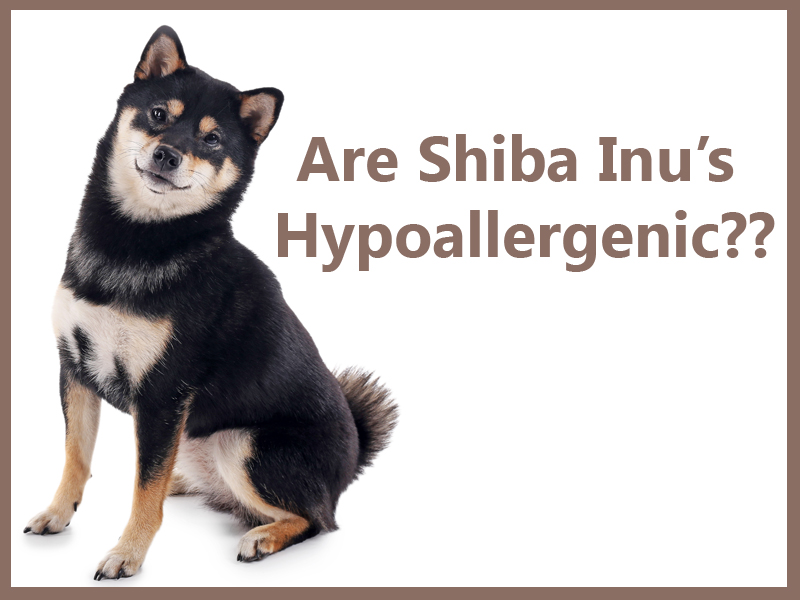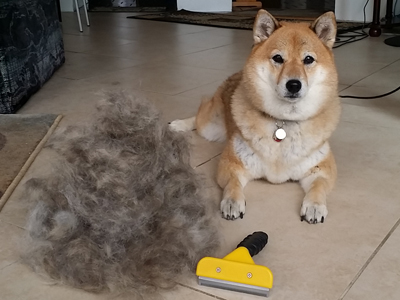Are Shiba Inu's Hypoallergenic?

On occasion, our posts contain affiliate links. However, we only recommend products that we truly believe in. For more information, visit my privacy policy page.
No Dogs are Hypoallergenic
Surprising Findings
A study published in 2011 by Veterinary News declared that there is no such thing as a hypoallergenic dog. The study states that there is no significant difference in the level of allergen between dog breeds that are ‘hypoallergenic’ and those that are not.
Further research is needed still, but if you have allergies do not depend on your pet to be 100% allergen free. The hypoallergenic dog is a myth with very little basis in medical proof.
Allergies to animals more commonly stem from their dander or saliva rather than the animal itself. Allergens manifest themselves in the the dry skin cells the dog sheds, their saliva and urine cells that may enter the air as they clean themselves, and all dogs have these.
Shiba Inu Shedding
Shiba Inus do shed heavily or "blow their coat" twice a year. Each shedding period lasts approximately one month. During this time, you will need to brush your Shiba Inu regularly to manage all the extra fur. When Shiba Inus are not blowing their coats, their normal shedding is quite manageable.

Shiba Inu Shedding Heavily
Healthy Shiba Inu coats have minimal odor as their outer coat is naturally water repelling. They are naturally extremely clean dogs, so if your allergies are manageable and you really want this breed, it could be possible.
Just How Allergic Are You?
Allergy tests are the best method to determine your allergic triggers. If you have very serious, severe allergies it is recommended that you do not own pet, as they can intensify your symptoms.
Those with respiratory issues, such as chronic bronchitis or asthma are advised to avoid interaction with pets. Though the link between allergies and asthma is still unclear. However if you only have minor allergies, medications are available to alleviate most symptoms.
Dog Allergy Symptoms
- Sneezing, Coughing, Sore Throat, Runny Nose
- Red, Watery Eyes
- Red Inflamed Skin, Rashes
- Swelling
An allergic reaction to dogs may include the following symptoms: sneezing, wheezing, rash, inflammation as well as many others. Allergies manifest themselves differently in everyone.
Be Aware of Serious Reactions
In some people an allergic reaction may result in an anaphylactic episode and posed a serious risk to your health. Anaphylaxis is a very serious lifelong condition, in the event you develop a life threatening allergy you will require an Epi-Pen.
If you experience the inability to breath properly, shortness of breath, or a severe painful rashing you should seek immediate medical attention.
Managing Your Dog Allergies
Living with allergies can take a lot of adjustment. Though with proper planning and a little home improvement the cohabitation of your pet and your allergies is quite possible. In your home opt for solid tile or hardwood flooring as opposed to carpeting, avoid fabric curtains in favor of vinyl and leather or other wipeable fabric furniture.
Also avoiding mechanically circulated air systems such as air conditioners or central air, or use Hepa Filters when these are unavoidable. To help allergens at the source, keep your Shiba clean but do not over-bathe - this can lead to dry skin and itchiness which then leads to more dander in the air.
Feed your dog the most healthy and nutritious food that you can afford to keep them happy with a healthy skin and fur.
Some leave-in conditioning products, like Allerpet may help but trial and error is needed with such products. If you are allergic to your pet’s saliva avoid letting them lick you or your clothing, especially after they have cleaned themselves.
Also train your Shiba not to relieve itself indoors to avoid coming in contact with urine particles that may worse your symptoms upon inhaling.
Advanced Options For Dealing With Dog Allergies
Treatment | Pro's: | Cons's: |
|---|---|---|
Immunotherapy/Allergy Shots | Very effective in ‘retraining’ the immune system | Expensive, Take a long time to work |
Steroidal/Antihistamine Nasal Spray | Very effective and quick | Steroidal sprays are addictive |
Antihistamine Pills | Very Fast Acting | Expensive in the long run. |
For any of these treatments, seek the advice of your general practitioner or clinician. Some of these treatments may not work for you or you may experience ill side effects so always talk to your doctor first.
Antihistamines of any kind can have some adverse side effects; trouble urinating or inability to urinate, drowsiness, confusion, blurred vision, nausea or vomiting, moodiness, or restlessness.
There is a possibility of developing an immunity to oral antihistamine products and having to change medications. There is not a lot of information available about the long term effects of antihistamine use.
Conclusion
In the end the decision to get a pet is a balance between the severity of your allergies and your ability to manage it. There are numerous benefits of dog ownership to consider.
Some of these benefits boost both physical, emotional, and mental well-being. However, if your allergy is severe and unmanageable, it is best to avoid getting a dog until your symptoms can be properly managed.
